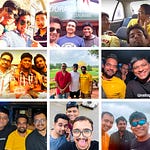
Hey there,
Hope you're having a great week! Here's your Friday mix of ideas, quotes, and a question to spark your curiosity across different areas. Just last week, with the long weekend for August 15th, I had a choice. Push one more project, one more email, or simply shut it all down. I chose the latter. I chose to be present. I chose to step away from the relentless churn and remember that the most critical supply chain is the one that connects you to yourself and your loved ones.
We live in a world that rewards being "on" all the time, but the true masters of any craft know that recovery is part of the training. Your brain, your body, your spirit—they are not endless resources - I have covered this in my last week’s reflection here. Taking that time off, disconnecting, and being fully present with family is not a luxury; it's a strategic investment in your long-term performance. It’s the difference between a sprint and a marathon. You can’t win the race if you burn out halfway through. The best work often comes after a period of real rest.
3 Ideas to Broaden Your Horizons
I. The AI Lever: Not a Replacement, but a Force Multiplier
I was just at the GCC AI Summit, and the air was electric. You had these titans of industry, the kind of people who build and break markets, all talking about one thing: AI. But it wasn't a tech conference. It was a strategy meeting. The consensus wasn't about the next algorithm; it was about the next wave of productivity. The message was brutal and clear: if you’re doing repetitive tasks, an AI agent is coming for them. And not just the grunt work. We’re talking about basic compliance checks, first-draft legal documents, even simple financial modeling. The conversation kept circling back to risk and compliance, not as a roadblock, but as a critical area for AI to optimize and secure. By 2030, this isn't just a possibility; it's the reality. Reports from sources like EY India and Google suggest that generative AI could add up to $438 billion to India's GDP by 2030. The workplace of the future won't have an "IT department" you call for help; it will be a mesh of human and AI collaboration, with AI agents handling the routine, freeing up humans to focus on the truly complex, creative, and strategic work.
II. The Compounding Machine of Knowledge
You're drowning in information, so stop trying to drink the ocean. The secret to learning faster isn't more books, it's a better system. It's about creating a latticework of mental models. Don't just read. Connect the dots. How does a principle from physics apply to your business strategy? How does a quote from a stoic philosopher inform your reaction to a bad email? Knowledge is like money; it compounds. Each new piece of information doesn't just add to the pile; it amplifies everything you already know. The most valuable skill isn't knowing everything, it's knowing how to connect things.
III. Scaling: The Art of Letting Go
Most people think "scaling up" means working harder. It's not. It's the opposite. It's about finding the one thing you do best—the unique value you create—and then building systems to handle everything else. It's about productizing yourself. The same way a company turns a unique insight into a repeatable process, you need to turn your unique talent into a repeatable system. It's a brutal, honest question you have to ask yourself: "What am I doing right now that someone or something else could be doing 10x better and faster?" Scale is about leveraging systems, not effort. It's about building a machine that runs itself, leaving you free to innovate, to create, to live.
Have an idea in mind? If you are interested to create, build / collaborate, dive right in.

Skills to Develop by 2030
When I talk to corporate leaders and young professionals across industries—from finance to manufacturing to tech—the same theme keeps popping up. The fear isn't that a robot will steal their job, but that they won't know how to work with the robot. The conversation has shifted from "What will AI replace?" to "What skills do I need to stay relevant?" It’s a gut check for everyone. I've seen a mid-level manager in a logistics firm, who used to spend hours manually tracking shipments, now mastering a new AI dashboard that predicts supply chain bottlenecks. His job isn't gone; it's evolved. He’s no longer a tracker; he's a strategic problem-solver. Similarly, I've seen a marketing analyst who used to crunch numbers by hand now using an AI tool to run a hundred different campaign scenarios in an hour, freeing them up to focus on the human side of marketing: the creative storytelling and emotional resonance. The future of work is not about competing with AI; it's about a symbiotic relationship where you leverage its power to amplify your own unique abilities. The AI revolution isn't a death knell for careers; it's a recalibration of what's valuable. The skills you need for 2030 fall into two buckets: those that let you work with AI, and those that AI can't touch.
Technical Skills (The "With AI" Skills) 🤖
Prompt Engineering: You won't just use AI; you'll direct it. The ability to craft precise, clear, and context-rich prompts to get the best output from an AI is becoming a core skill.
Data Literacy: AI is built on data. You don't need to be a data scientist, but you must understand how to interpret data, identify patterns, and make data-driven decisions.
Cybersecurity & AI Ethics: As AI systems become more integrated, knowing how to secure them and understanding the ethical implications—like algorithmic bias and privacy—is critical.
Human-Centric Skills (The "Beyond AI" Skills) 🧠
Critical Thinking and Complex Problem-Solving: AI can solve defined problems, but it can't identify the right problems to solve. That requires human judgment, systems-level thinking, and the ability to navigate ambiguous situations.
Creativity and Adaptability: AI can generate content, but it can't create truly novel ideas or innovate outside of its training data. Your ability to think creatively and adapt to a constantly changing landscape is a unique human advantage.
Emotional Intelligence & Leadership: Empathy, collaboration, and the ability to motivate and lead people are skills that cannot be automated. As AI handles routine tasks, these "soft" skills will become the differentiator in leadership, client relations, and team management.
2 Quotes to Fuel Your Thoughts
"The only real valuable thing is intuition."
- Albert Einstein
Einstein wasn't just talking about a gut feeling. He meant that the deepest insights, the breakthroughs in science and art, don't come from pure logic alone. They emerge from an unconscious synthesis of all your knowledge and experience. Your rational mind can process and analyze, but it's your intuition—that "sacred gift"—that connects the seemingly unrelated dots to create something new. In an AI-driven world where machines handle the data, this human capacity for intuitive leaps becomes your most valuable asset.
"The most powerful thing you can do is control your mind."
- Naval Ravikant
This is the bedrock of all personal scaling. You are your own bottleneck. Most of your daily suffering isn't from external events, but from your reaction to them. The mind, left unchecked, is a wild horse. It creates anxiety about the future and regret about the past. To scale up in life—to achieve peace, wealth, and freedom—you must first master your own internal narrative. By training your mind to focus on what you can control and letting go of what you can't, you create the mental clarity needed for effective action.
1 Question to Stir Your Curiosity
If you had to teach your most valuable skill to an AI, what would the first lesson be, and how would you codify it?










